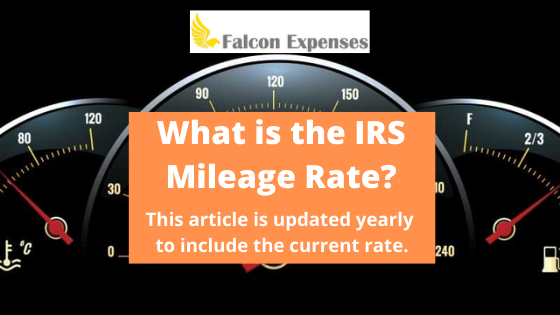What are the IRS Mileage Rate Amounts (Updated for 2023)
Table of Contents
An up-to-date chart of IRS mileage rate tax deduction amounts, how to use them, and sample calculations.

IRS Standard Mileage Rates (Updated Yearly)
Below, the table shows the minimum IRS standard mileage rate allowed by the IRS. We update this chart yearly as the IRS publishes the new rates. So bookmark this article.
In addition, this table is updated as the IRS updates the standard mileage rate tax write-offs. The IRS typically updates these rates at the beginning of every year and sometimes halfway through the year.
The standard mileage rate tax deduction is set by the IRS every year. This is the per-mile amount that a taxpayer can deduct from their taxes for each mile driven for business.
| Applicable Period | Rates(in cents per mile) |
|---|---|
| 2023 | Business: 65.5 Charitable: 14 Medical & moving: 22 |
| 2022 | Business: 58.5 Charitable: 14 Medical & moving: 18 |
| 2021 | Business: 56 Charitable: 14 Medical & moving: 16 |
| 2020 | Business: 57.5 Charitable: 14 Medical & moving: 17 |
| 2019 | Business: 58 Charitable: 14 Medical and moving: 20 |
| 2018 | Business: 54.5 Charitable: 14 Medical and moving: 18 |
| 2017 | Business: 53.5 Charitable: 14 Medical and moving: 17 |
| 2016 | Business: 54 Charitable: 14 Medical and moving: 19 |
| 2015 | Business: 57.5 Charitable: 14 Medical and moving: 23 |
| 2014 | Business: 56 Charitable: 14 Medical and moving: 23.5 |
| 2013 | Business: 56.5 Charitable: 14 Medical and moving: 24 |
| 2012 | Business: 55.5 Charitable: 14 Medical and moving: 23 |
| 2011 (July 1 to December 31) | Business: 55.5 Charitable: 14 Medical and moving: 23.5 |
| 2011 (January 1 to June 30) | Business: 51 Charitable: 14 Medical and moving: 19 |
| 2010 | Business: 50 Charitable: 14 Medical and moving: 16.5 |
| 2009 | Business: 55 Charitable: 14 Medical and moving: 24 |
| source: IRS Standard Mileage Rates |
Please note that the standard mileage rate tax write-off amounts can only be used if the taxpayer uses the Standard Mileage Rate method when taking a mileage expense deduction on their tax return.
How to Use IRS Mileage Rate Tax Deduction Amounts
There are two methods that a taxpayer can use to calculate business use car tax deductions. The taxpayer must choose one, as you cannot use both at the same time. It is up to the taxpayer to choose which one is best for them.
- the IRS standard mileage rate method
- the IRS actual expense method
The IRS mileage rate tax write-off amounts only apply to the first method, the Standard Mileage Rate Method. Therefore, you don’t need this chart if you are using the Actual Expense Method. For a detail of the two different methods, and what is required of each method, please check out the following article:
How To Maximize Business Use Car Tax Deductions: Standard Mileage Rate Method vs Actual Expense Method
The IRS standard mileage rate method is a method of deducting an IRS-established dollar amount per tax-deductible business mile driven. Further, this method can only be used by the owner or lessor of the vehicle. To use this method the taxpayer must keep a record or mileage log of the miles they drove for business. More specifically, this log needs to include the destination and business purpose of the trip. Some people prefer to use an auto mileage tracker app that uses GPS technology to automatically track their mileage as they drive.
Please read the following article for more information about the IRS requirements for a proper mileage log.
What Does the IRS Require for Keeping an Adequate Mileage Log?
Example Standard Rate Mileage Tax Deduction Calculation
An example of how to calculate your tax deduction amount using the standard mileage rate tax deduction method with the 2018 amounts.
Ronny drove about 100 miles a day for business each workday of 2018. Also, Ronny kept a detailed mileage log of his drives, as per the IRS requirements. At the end of the year, his mileage log showed that he drove a total of 21,950 miles for work.
How do you calculate Ronny’s end of year (for 2018) mileage expense tax deduction?
You multiply the total number of miles that Ronny drove for work by the standard mileage rate tax deduction per mile for 2018. The standard mileage rate tax deduction for miles driven for business for 2018 is 54.5 cents per mile.
Ronny’s Mileage Expense Tax Deduction
$0.545 x 25,000 miles driven = $13,625
Important Note:
Ronny’s tax-deductible amount from his mileage expenses alone was larger than the individual standard deduction for 2018, which is $12,000. Therefore, it paid off for Ronny to keep a mileage log as by doing so he was able to maximize his tax return.
What is considered a business drive by the IRS?
Only miles driven with your car for business use are considered tax-deductible. With that said, this is what the IRS considers business use of your car?
- Business meals and entertainment
- Customer visits
- Airport / travel
- Travel between offices
- Temporary job sites
- Errands / supplies
- Odd jobs
Please review the following article for more information about what defines each of these categories: What Business Mileage is Deductible?
About Falcon Expenses
Falcon Expenses is a top-rated mobile application for self-employed and small businesses to track expenses and tax deductions. Falcon customers record $6,600, on average, in annual tax deductions. Get started today. The longer you wait, the more tax deductions you miss out on.
Automatically track mileage expenses and expenses, keep an odometer log, receipt vault and log billable hours. Quickly organize expenses by time period, project, or client. Easily prepare reports to email to anyone in PDF or spreadsheet formats, all from your phone. Falcon’s expense report template includes everything to meet IRS recordkeeping requirements. Use for keeping track of tax deductions, reimbursements, taxes, record keeping, and more. Falcon Expenses is great for self-employed, freelancers, realtors, business travelers, truckers, and more.
Was this article helpful?
We are a team of writers and contributors with a passion for creating valuable content for small business owners, self-employed, entrepreneurs, and more.
Feel free to reach out to use as support@falconexpenses.com





